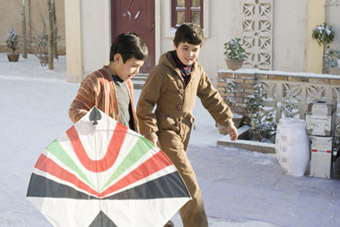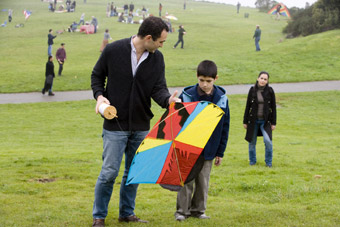"Despite (author) Hosseini's evocative prose and (director) Forster and
(screenwriter) Benioff's epic efforts, The Kite Runner – in the end needs
no language. It probably doesn't even need subtitles." |
Jesse Jarnow, Paste magazine.com |
Isn't that one of Hitchcock's dictums, that if a movie's sound fell mute, you should still be able to follow the plot and emotion of the story from the visuals alone? Well, director Mark Forster works no small magic on Khaled Hosseini's best-selling novel. The Kite Runner tells the story of a repressed boy who becomes a man finally able to live up to his responsibilities after a period of sweeping political and religious changes to his homeland. Let's say this out loud despite the intended slant of this site's coverage; subtitles are a pain in the ass. Don't get me wrong, dubbing is worse but when cinema presents different cultures, different landscapes and different cultural norms, it has to rely on the written word, those (in this case) yellow letters that yank your eye south when you want to revel in the extraordinary images served up by a vast but talented crew. I was tempted not to read them but chickened out, afraid I'd miss something important. Thankfully (and surprisingly given the majors involved in financing and distribution) the movie is in English fifty percent of the time when appropriate and the other fifty in sub-titled Dari, Pashto and Urdu, the languages of the region. This is as it should be.

Author Milan Kundera once suggested that madness begins once the place you call home changes even in name. Afghanistan is, even now, a troubled place. In 1979, the Russians invaded this landlocked, vulnerable but resilient country. It got worse. After a decade of nastiness, the two hundred thousand-strong pro-communist fighters left the country having killed hundreds of thousands of Afghans during their rule. Subsequently, the country was plunged into localised civil war. Warlords sprang up, pockets of parochial but powerful men who used violence to assert authority. Then, over a period of 4 years from 1996, the Taliban seized control (those bearded souls who enforce the strictest interpretation of Islamic Sharia law; no shaving, stonings for adultery, the almost complete suppression of women, that sort of thing). They make the collective idea of enlightenment, intellect and morality into something quite alien. The US coalition stormed in after 9/11 but this invasion is beyond the scope of The Kite Runner's narrative but it adds further proof of Afghanistan's woes nevertheless. In amongst this religiously-inspired brutal landscape of human misery and woe stands something heartening and universal.
It's been said (not least in these pages) that across cultures, there are things we all share (apart from myths and stories). Caring for one another, our friends and family, seems to be a constant. The raw humanity of people, their capacity for generating goodness as well as suffering seems undiminished regardless of societal restraints and religious law. It is refreshing to see the more humane traits thrust to the fore in characters living in Kabul (one wants to say 'human' for a second time but given second thoughts, on the whole the human race collectively is pretty nasty). The featured Afghanis here are not so different from westerners. Due to a reasonable budget and a serviceable marketing campaign (not to mention the lure of the best seller on which the movie is based), said westerners may even turn out to see this solemn but immensely rewarding work.
Oscar recognition doesn't hurt and as the US are still a semi-invading force in the country at the moment, it's a perfect chance for Hollywood to get 'contrite' on behalf of its government. Hell, if 9/11 got Woody Allen to turn up in L.A., who knows what's possible anymore. Goodness and grace seem to cross cultural divides as easily as air at a checkpoint. How far against or for our self-preservation we uphold these principles is up to each of us; though in the west, we are rarely called upon to have our mettle smashed on the anvil of a truly dangerous encounter. But it's a safe bet we'd all like to be as brave as Baba, the father of The Kite Runner's hero.
Baba, beautifully and honourably played by Homayoun Ershadi, is en route with his son Amir, to Pakistan after the Russian invasion forces them to flee for their lives. A uniformed Russian soldier, cradling a Kalashnikov, demands half an hour with another man's wife as payment for safe passage. Baba is outraged and braves the youth's temper and the language barrier to challenge him to shoot (and that the first shot better be a good one because if not, Baba will tear him apart). The outrage is palpably real and the intended victim's husband, alas not so brave, is tearful in his gratitude. The young would-be rapist is silenced by the arrival of superior officers. But in such a short scene, Forster makes us see how effortless the ownership of a weapon, an easily accepted immorality and having been brainwashed into seeing the Afghans as lower class allows some men to assume that unleashing degradation is their birthright.

Early in the film, Baba is asked by his son why he drinks if it has been pronounced a sin. In a small exchange we learn that Baba is a man of means and principles but personal ones taken from experience not eked out from a book interpreted and reinterpreted by Mullahs, self styled translators of Allah's will. It is a hook western audiences can hold on to. This man denies religious rule and will pay the price in a land soon to become full of horrific barbarity. Just before the Soviets invade, Baba's son, retiring Amir and his confident best friend Hassan, both take part in kite tournaments in the capital Kabul. The kite flying sequences work superbly well due to two faultlessly executed crafts in the film-maker's arsenal. Alberto Inglesias's score is deserving of all praise already heaped upon it. It is without sentimentality, ethnically grounded but full of emotion – no mean feat. It soars with the kites and helps to make clear the kite narrative (I mean, who would have thought kites could cut opponent's strings?) and does not intrude upon more weighty moments of emotional revelation. In short, for this movie, his work is exemplary.
Secondly, as many of the kite sequences are shot from above the kites (yes, you read that right) one must assume a great deal of CG was utlilised. Well, that may be the case (it is) but together with the superb sound effects and design courtesy of sound designer Steve Boeddeker, the kites are living things, the boys' wind propelled avatars, soaring when they cannot, fighting when they are not capable and cutting opponents down to size. On the ground, their nemeses are older, taller boys who pick on the under-classes. The kite flying, above all things, is a competition. Their glass-flecked strings are designed to cut opponents' twine and the last kite flying is the winner while the final vanquished kite (taken on the wind) is sought as a great status symbol of victory. Hassan 'just knows' where these kites come to rest (hence 'Kite Runner') and Amir is in some awe of this ability and the unquestioning loyalty his friend shows him.
There is a caveat to their friendship. Amir is the son of a well to do citizen of Pashtun ethnicity. Hassan belongs to the lower caste Hazara and as such, he and his own father are Baba's servants. Stunningly played by the effortlessly natural Ahmad Khan Mahoodzada, Hassan is the moral centre of the film. Unswervingly loyal, good to a fault (and to the end), he inhabits the film like no other character despite his limited screen time. Yes, the burden of narrative lays on the older Amir's shoulders, again convincingly played by Khalid Abdalla (the featured terrorist pilot in Paul Greengrass' United 93), but the film is about personal redemption and the recognition of repression and as such the 'thing' suppressed is usually more powerful than the act of recognising it. Hassan's love and loyalty run through the film like oil through an engine.
After Amir wins one of the kite tournaments, the bully Assef corners Hassan who has found the losing kite. He wants to present it to his best friend Amir. He will not give up the kite and for this fierce loyalty, he is raped. Amir watches the attack and repulsed by his own cowardice (so close to wisdom in certain un-winnable confrontations), he drives the incident into the back of his mind where it sits, disease-like, infecting his every waking moment. Trying to make Hassan hate him has the opposite effect. Amir throws pomegranates at his friend and they explode bloodily. Amir needs Hassan to despise him. Instead, the eerily enlightened Hassan strikes himself on the head with another fruit and walks off befuddled as to his friend's new, dark state of mind.
The revelations that follow as we tell the tale from Amir's comfortable San Francisco based future are as surprising as they are inevitable. Amir has to face up to a past he feared and did not understand. How he does this and how the film ends is an experience no one should ruin for you (presuming you've not read the book). If you have, there are tweaked scenes; one in particular changes events to up the tension which is by and large acceptable. As this is a western interpretation (with only half of the film in subtitles) of an eastern tale, it's the perfect introduction to cinema not completely bound up in the overselling of sugar water and popped corn. But if you're on this site, then I guess you need no primers for more challenging cinema.
The Kite Runner, like Perfume, goes into the top ten of the list of those movies made from difficult-to-shoot books but it manages to become a supremely satisfying entity in its own right.
|